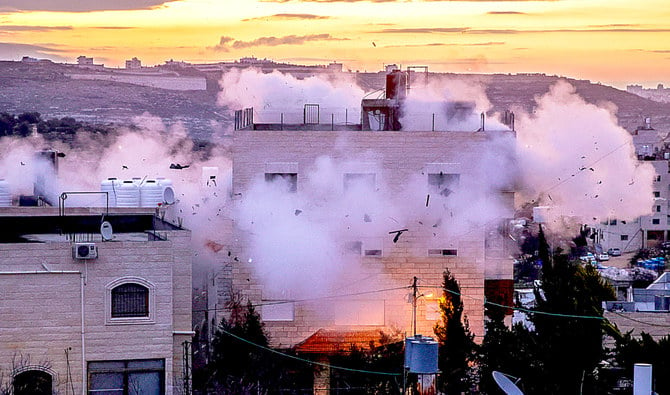RAMALLAH: Palestinian prisoners in Israeli jails have launched a protest campaign against punitive measures brought in by National Security Minister Itamar Ben-Gvir.
Widespread demonstrations have led to increased tensions in prisons, and a situation that Palestinian prisoner affairs officials on Thursday warned could boil over if not addressed.
Protests erupted after the Israeli Prisons Administration began imposing collective punishment against Palestinians including by closing canteens and other facilities on Friday and Saturday.
Also under the new rules, prisoners leaving their cell will be handcuffed, even if attending the prison clinic, showering is being limited to three minutes in hot water, monthly family visiting has been further restricted, and morning sports are being halted.
Earlier this month, Ben-Gvir ordered the closure of bakeries providing inmates with daily bread.
In response to the moves, the Supreme Emergency Committee for Prisoners announced an immediate disobedience campaign followed by a hunger strike to mark the start of Ramadan.
Qadura Faris, head of the Palestinian Prisoners Club, told Arab News that the latest measures were government inspired and aimed at humiliating and breaking the will of prisoners and the Palestinian people.
He said the situation had been brought to the attention of relevant international bodies which had been urged to intervene and put pressure on the Israeli government to ease the measures.
Meanwhile, the Palestinian Prisoners Club in Ramallah said that the Israeli army had arrested 32 Palestinians in the West Bank at dawn on Thursday, bringing the number held since the beginning of the year to 800.
Laila Zawahra, from Bethlehem, the 70-year-old mother of a man given a life sentence, told Arab News that the families of the detainees were going through difficult times because of the strict Israeli measures.
She claimed that prison authorities had started transferring inmate leaders in a bid to derail organized protests.
“I am very concerned about my son Mohammed, who is 41, and about the situation of his fellow prisoners. In addition to their suffering from this cold weather, they will start a hunger strike on the first day of Ramadan,” Zawahra said, adding that she and other families of prisoners were planning to stage sit-ins to highlight the inmates’ plight.
Israel currently has 4,780 Palestinians in detention, including 160 children, 29 women, and 914 administrative detainees.
Palestinian political analyst Riyad Qadriya told Arab News that the latest targeting of prisoners by the Israeli government could spark street demonstrations.
Israeli journalist Dana Ben-Shimon told Arab News that Ben-Gvir had advocated a tough stance against Palestinian prisoners even before becoming a minister.
“Now he is doing this to satisfy the public who elected him. The Israeli security services are aware that any measures taken against Palestinian prisoners will have an impact on the Palestinian public outside the prison, even in the Gaza Strip, which is witnessing a state of calm different from the situation in the West Bank,” she said.

